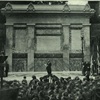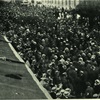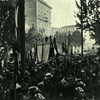On September
20th, 1870, the Italian
troops burst into Rome, after a brief siege, from a breach in the Aurelian
Walls opened between Porta Pia and Porta Salaria.
Rome was then joined Italy, of which on February 3rd, 1871 it became
the capital, and the temporal power of the Catholic Church, which
had lasted for centuries, ended.
The pope took refuge within the Vatican walls, in what a few decades later
would become the state of the Vatican City.
The date of September 20th is remembered by important streets and
squares in all Italian cities and until the Lateran Treaty of
1929 it was a public holiday, the Liberation Day of the capital
and national unification.
On September 20th, 1920, on the
fiftieth anniversary of the capture of Rome, a monument was placed on
the spot where the breach had been opened, which was closed in
1871, and an impressive popular procession went to
the place
to commemorate the event.
On September 20th, 1970, the first
centenary of the Porta Pia breach was solemnly commemorated, with
an official ceremony and military bands, in particular that of
the Bersaglieri, the military
corps who in 1870 had been decisive for the conquest of Rome.










Today
there is a tendency to commemorate this day in an attenuated way,
and without emphasizing that if Italy has won it means that the
absolutist state of the Church has lost.
In 2020, the 150th anniversary was
commemorated in a very modest way, maybe the Covid was to blame
for it. But in 2005 and 2007 even the bicentenaries of the birth
of Giuseppe
Mazzini
and Giuseppe
Garibaldi
went almost unnoticed, yet they were two of the fathers of the
homeland.
Perhaps their fault was that they were anticlerical.
For September 20th: only free-thinking
associations commemorate him with ceremonies in front of the monument built in the
place where the breach was opened.
Better than nothing.
Bibliography:
Digiteca della
Biblioteca di Storia moderna e contemporanea di Roma http://digiteca.bsmc.it/?l=indici%20periodici&t=#


 Page
created on: November
12th, 2022 and last updated: September 19th, 2025
Page
created on: November
12th, 2022 and last updated: September 19th, 2025